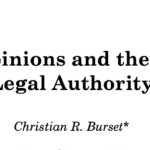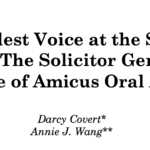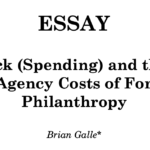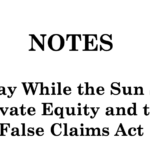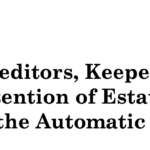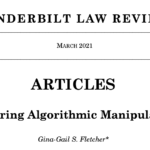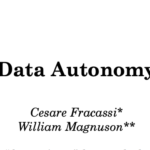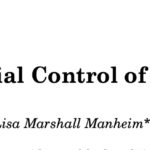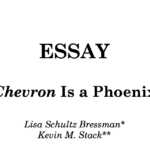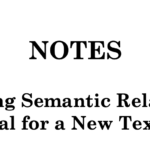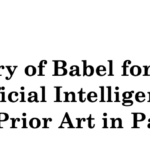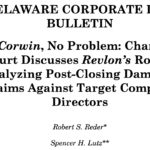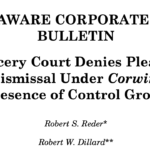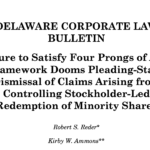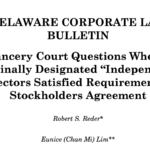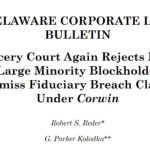Volume 74 Category
Advisory Opinions and the Problem of Legal Authority
Apr. 20, 2021—Christian R. Burset | 74 Vand. L. Rev. 621 (2021) | The prohibition against advisory opinions is fundamental to our understanding of federal judicial power, but we have misunderstood its origins. Discussions of the doctrine begin not with a constitutional text or even a court case, but a letter in which the Jay Court rejected...
The Loudest Voice at the Supreme Court: The Solicitor General’s Dominance of Amicus Oral Argument
Apr. 20, 2021—Darcy Covert & Annie J. Wang | 74 Vand. L. Rev. 681 (2021) | The Solicitor General (“SG”) is often called the “Tenth Justice,” a title that captures his unique relationship with the Supreme Court and his independence from the executive branch. No phenomenon better reflects this relationship than the Court’s practice of permitting amici...
The Quick (Spending) and the Dead: The Agency Costs of Forever Philanthropy
Apr. 20, 2021—Brian Galle | 74 Vand. L. Rev. 757 (2021) | American philanthropic institutions control upwards of a trillion dollars of wealth. Because contributions to these entities are deductible from both income and estate taxes, and the entities’ earnings are tax-free, that trillion dollars is heavily underwritten by contemporary taxpayers. Law offers little assurance that those...
Make Hay While the Sun Shines: Private Equity and the False Claims Act
Apr. 20, 2021—Gregory F. Maczko | 74 Vand. L. Rev. 797 (2021) | For years, the federal government has used the False Claims Act to police fraud in the healthcare industry. Every year, the Department of Justice recovers billions of dollars from healthcare companies for their False Claims Act violations, both penalizing wrongdoers and providing incentives for...
Creditors, Keepers: Passive Retention of Estate Property and the Automatic Stay
Apr. 20, 2021—Caitlin M. McAuliffe | 74 Vand. L. Rev. 829 (2021) | The automatic stay provision is one of the most important provisions in the Bankruptcy Code. Until recently, however, it has remained unclear if passive retention of property of the bankruptcy estate must be immediately turned over to the debtor under the automatic stay provision....
Deterring Algorithmic Manipulation
Mar. 24, 2021—Gina-Gail S. Fletcher | 74 Vand. L. Rev. 259 (2021) | Does the existing anti-manipulation framework effectively deter algorithmic manipulation? With the dual increase of algorithmic trading and the occurrence of “mini-flash crashes” in the market linked to manipulation, this question has become more pressing in recent years. In the past thirty years, the financial...
Data Autonomy
Mar. 24, 2021—Cesare Fracassi & William Magnuson | 74 Vand. L. Rev. 327 (2021) | In recent years, “data privacy” has vaulted to the forefront of public attention. Scholars, policymakers, and the media have, nearly in unison, decried the lack of data privacy in the modern world. In response, they have put forth various proposals to remedy...
Presidential Control of Elections
Mar. 24, 2021—Lisa Marshall Manheim | 74 Vand. L. Rev. 385 (2021) | In recent decades, presidents of both political parties have asserted increasingly aggressive forms of influence over the administrative state. During this same period, Congress has expanded the role that the federal government plays in election administration. The convergence of these two trends leads to...
Chevron Is a Phoenix
Mar. 24, 2021—Lisa Schultz Bressman & Kevin M. Stack | 74 Vand. L. Rev. 465 (2021) | Judicial deference to agency interpretations of their own statutes is a foundational principle of the administrative state. It recognizes that Congress has the need and desire to delegate the details of regulatory policy to agencies rather than specify those details...
Measuring Semantic Relatedness: A Proposal for a New Textual Tool
Mar. 24, 2021—Katherine A. Cohen | 74 Vand. L. Rev. 483 (2021) | Judicial decisions, statutes, constitutions, sentencing guidelines, and ERISA-related documents have at least one thing in common: at a molecular level, the laws are all composed of words. The scientific study of linguistics, particularly the field of semantics, analyzes what words mean and how they...
The Library of Babel for Prior Art: Using Artificial Intelligence to Mass Produce Prior Art in Patent Law
Mar. 24, 2021—Lucas R. Yordy | 74 Vand. L. Rev. 521 (2021) | Artificial intelligence is playing an increasingly important role in the invention and innovation processes of our society. To date, though, much of the academic discussion on the interaction of artificial intelligence and the patent system focuses on the patentability of inventions produced by artificial...
No Corwin, No Problem: Chancery Court Discusses Revlon’s Role in Analyzing Post-Closing Damages Claims Against Target Company Directors
Mar. 12, 2021—Robert S. Reder & Spencer H. Lutz | 74 Vand. L. Rev. En Banc 71 (2021) | The Vice Chancellor’s opinion offers perhaps the clearest explanation to date of how damages claims asserting breach of so-called “Revlon duties” will be analyzed post-Corwin. As Corwin instructs, “Revlon ‘duties’ should not be confused with the Revlon standard...
Chancery Court Denies Pleading-Stage Dismissal Under Corwin due to Presence of Control Group
Mar. 12, 2021—Robert S. Reder & Robert W. Dillard | 74 Vand. L. Rev. En Banc 61 (2021) | Garfield further limits the reach of Corwin: even if all the elements are met, the presence of a “control group” realizing benefits from a transaction not shared with other stockholders negates the availability of Corwin. In light of...
Failure to Satisfy Four Prongs of MFW Framework Dooms Pleading-Stage Dismissal of Claims Arising from Controlling Stockholder-Led Redemption of Minority Shares
Mar. 12, 2021—Robert S. Reder & Kirby W. Ammons | 74 Vand. L. Rev. En Banc 47 (2021) | Dell Technologies offers significant guidance to dealmakers and their legal counsel for structuring commercial transactions involving controlling stockholders. Vice Chancellor Laster’s comprehensive opinion demonstrates that simply paying lip service to the “six necessary and sufficient conditions for obtaining...
Chancery Court Questions Whether Nominally Designated “Independent” Directors Satisfied Requirements of Stockholders Agreement
Mar. 12, 2021—Robert S. Reder & Eunice (Chan Mi) Lim | 74 Vand. L. Rev. En Banc 37 (2021) | Chancellor Bouchard’s blanket rejection of the Coty Stockholder Litigation defendants’ motions to dismiss demonstrates the Chancery Court’s refusal blindly to accept procedural safeguards purportedly put in place to protect minority stockholders. Instead, in the face of well-pled...
Chancery Court Again Rejects Motion by Large Minority Blockholder to Dismiss Fiduciary Breach Claims Under Corwin
Feb. 5, 2021—Robert S. Reder & G. Parker Kolodka | 74 Vand. L. Rev. En Banc 25 (2021) | Vice Chancellor Slights’s extension of the inherent coercion doctrine to the summary judgment phase in Tesla II demonstrates the risks faced by dealmakers who hope to rely on a Corwin defense when a potential controlling stockholder is in...
